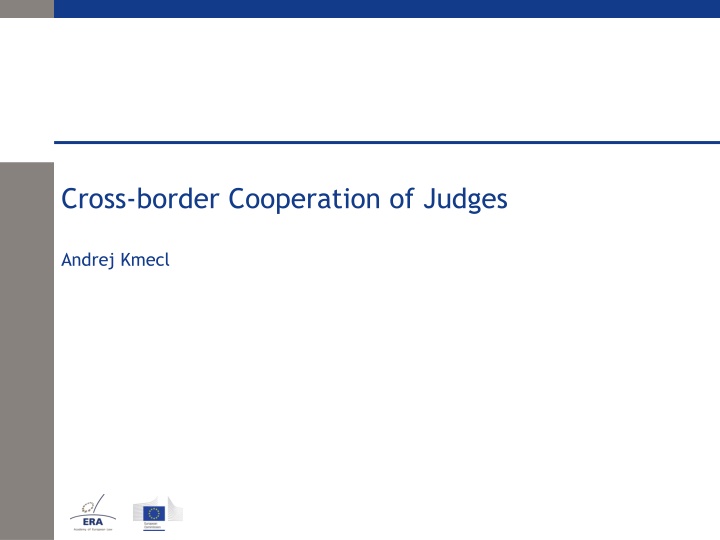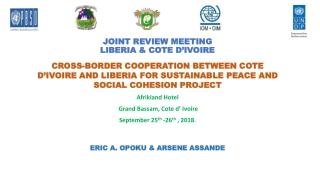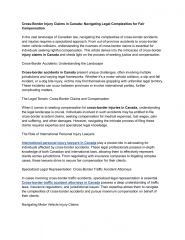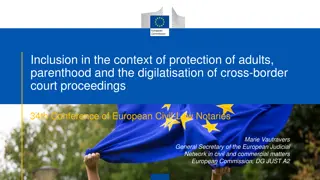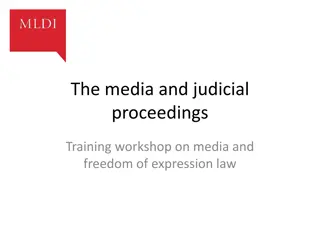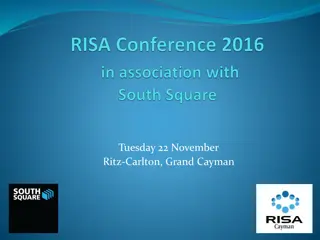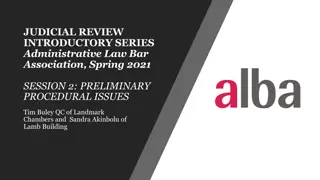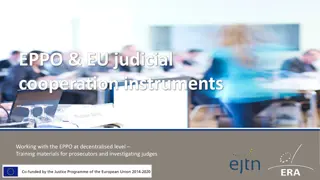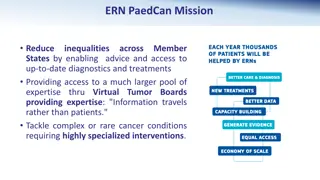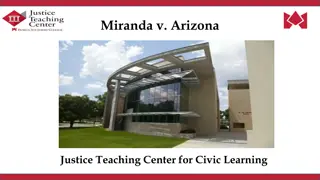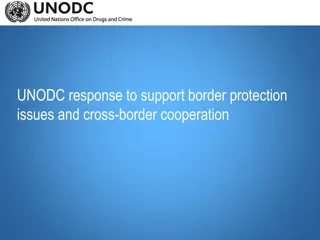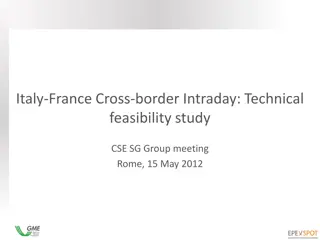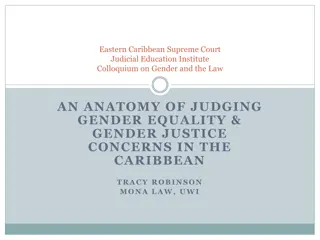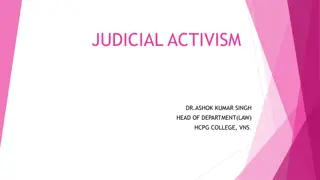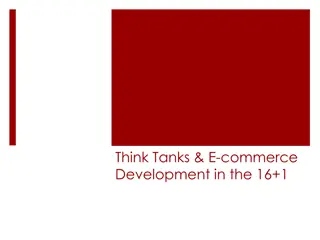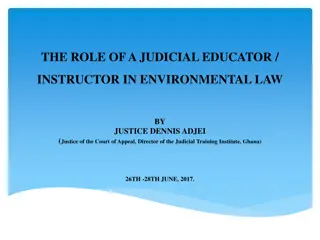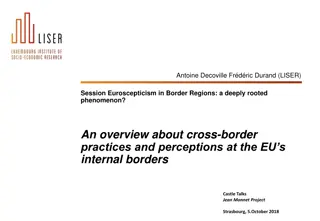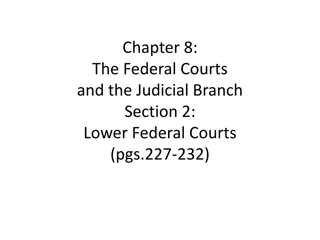Cross-Border Cooperation of Judges: Environmental Cases and Judicial Proceedings
Different aspects of judicial cooperation in environmental cases, focusing on practical scenarios like serving documents and taking evidence, as well as broader European Union policies for environmental protection and the European area of justice. Emphasis is placed on ensuring access to review procedures before courts or independent bodies for challenging legality of decisions, acts, or omissions. The cooperation between Member States aims to involve the public in consultations and decision-making processes affecting cross-border activities.
Download Presentation

Please find below an Image/Link to download the presentation.
The content on the website is provided AS IS for your information and personal use only. It may not be sold, licensed, or shared on other websites without obtaining consent from the author.If you encounter any issues during the download, it is possible that the publisher has removed the file from their server.
You are allowed to download the files provided on this website for personal or commercial use, subject to the condition that they are used lawfully. All files are the property of their respective owners.
The content on the website is provided AS IS for your information and personal use only. It may not be sold, licensed, or shared on other websites without obtaining consent from the author.
E N D
Presentation Transcript
Cross-border Cooperation of Judges Andrej Kmecl
Cross-border Cooperation of Judges Different aspects of judicial cooperation in environmental cases: Practical, related to actual court proceedings (serving of documents, taking evidence) General, related to EU policies in the areas of protection of the environment and creation of the European area of justice through cooperation
Cross-border Cooperation of Judges Practical aspect: Numerous industrial installations are (or will be) located near international borders In such cases, "members of the public concerned" (Art. 25 para. 1 IED and Art. 9 para. 2 Aarhus convention) will likely include foreign nationals
Cross-border Cooperation of Judges Each Party shall, within the framework of its national legislation, ensure that members of the public concerned (...) have access to a review procedure before a court of law and/or another independent and impartial body established by law, to challenge the substantive and procedural legality of any decision, act or omission (...) (Art. 9 para. 2 Aarhus convention)
Cross-border Cooperation of Judges Member States shall ensure that, in accordance with the relevant national legal system, members of the public concerned have access to a review procedure before a court of law or another independent and impartial body established by law to challenge the substantive or procedural legality of decisions (...) (Art. 25 para. 1 IED)
Cross-border Cooperation of Judges Within the framework of their bilateral relations, Member States shall ensure that in the cases referred to in paragraph 1, the applications are also made available for an appropriate period of time to the public of the Member State likely to be affected so that it will have the right to comment on them before the competent authority reaches its decision. The results of any consultations pursuant to paragraphs 1and 2 shall be taken into consideration when the competent authority reaches a decision on the application. The competent authority shall inform any Member State which has been consulted pursuant to paragraph 1 of the decision reached (...) That Member State shall take the measures necessary to ensure that that information is made available in an appropriate manner to the public concerned in its own territory. (Art. 26 para. 2, 3 and 4 IED)
Cross-border Cooperation of Judges Within the scope of the relevant provisions of this Convention, the public shall have access to information, have the possibility to participate in decision-making and have access to justice in environmental matters without discrimination as to citizenship, nationality or domicile and, in the case of a legal person, without discrimination as to where it has its registered seat or an effective centre of its activities. (Art.3 para. 9 Aarhus convention) Any such procedure shall be fair, equitable, timely and not prohibitively expensive. (Art. 25 para. 4 IED)
Cross-border Cooperation of Judges Bottom line: in case of transboundary effects, individual rights conferred by the EU law sum up to grant full access to court to residents of other Member states... ... however, on the other hand the EU law provides no procedural tools to facilitate this right. Among the most important questions in this regard will be service of documents and taking of evidence.
Cross-border Cooperation of Judges According to European Judicial Atlas, 12 Member states do not object to direct service of documents (Ireland, Portugal, France, Italy, Luxembourg, the Netherlands, Denmark, Greece, Cyprus, Sweden, Finland and Belgium) When serving documents to other Member states, it has to be done according to bilateral agreements or by diplomatic means As a rule, taking of evidence will be even more difficult Effectiveness of judicial protection may be questionable
Cross-border Cooperation of Judges Possible solution: use of mechanisms in place for civil and commercial matters Subsidiary use of civil procedure in many national administrative dispute procedures Common principles: as a rule, if a document is served or evidence taken correctly according to civil procedure, requirements of administrative dispute procedure will be satisfied as well However: EU legal instruments either mention civil or commercial matters only, or even specifically exclude administrative matters
Cross-border Cooperation of Judges Service of judicial and extrajudicial documents: Regulation (EC) No 1393/2007 of the European Parliament and of the Council of 13 November 2007 on the service in the Member States of judicial and extrajudicial documents in civil or commercial matters Taking of evidence: Regulation (EC) No 1206/2001 of 28 May 2001 on cooperation between the courts of the Member States in the taking of evidence in civil or commercial matters
Cross-border Cooperation of Judges Direct communication between authorities Transmitting agencies Receiving agencies Central authority Use of forms Strict deadlines One month (service of documents) 90 days (taking of evidence) Limited grounds for refusal
Cross-border Cooperation of Judges Possible obstacles: Scope of the Regulations 1. This Regulation shall apply in civil or commercial matters where the court of a Member State, in accordance with the provisions of the law of that State, requests: (a) the competent court of another Member State to take evidence; or (b) to take evidence directly in another Member State. 2. A request shall not be made to obtain evidence which is not intended for use in judicial proceedings, commenced or contemplated. 3. In this Regulation, the term "Member State" shall mean Member States with the exception of Denmark. (Art. 1 Council Regulation (EC) No 1206/2001 of 28 May 2001)
Cross-border Cooperation of Judges Possible obstacles: Scope of the Regulations 1. This Regulation shall apply in civil and commercial matters where a judicial or extrajudicial document has to be transmitted from one Member State to another for service there. It shall not extend in particular to revenue, customs or administrative matters or to liability of the State for actions or omissions in the exercise of state authority (acta iure imperii). 2. This Regulation shall not apply where the address of the person to be served with the document is not known. 3. In this Regulation, the term "Member State" shall mean the Member States with the exception of Denmark. (Art. 1 Regulation (EC) No 1393/2007 of 13 November 2007)
Cross-border Cooperation of Judges Possible obstacles: Grounds for refusal (taking of evidence) the request does not fall within the scope of the Regulation the execution of the request does not fall within the functions of the judiciary; the request is incomplete; a person of whom a hearing has been requested claims a right to refuse, or a prohibition, from giving evidence; a deposit or advance relating to the costs of consulting an expert has not been made.
Cross-border Cooperation of Judges Possible obstacles: Status of the relevant court Expressly designated as transmitting agency Among the "users" of a designated transmitting agency Not related to the transmitting agency
Cross-border Cooperation of Judges General aspect of judicial cooperation: judicial associations and networks Highly specialised training Exchange of information Networking
Cross-border Cooperation of Judges European Judicial Training Network (EJTN) http://www.ejtn.net Membership: national judicial training organisations Scope: Development of various seminars, programmes and curricula "with a genuine European dimension" Methods of work: Permanent secretariat, meetings of General Assembly, Working groups and Sub-Working groups
Cross-border Cooperation of Judges EJTN: Actual activities Judicial exchange programmes Training programmes, including Training the Trainers and Linguistics Numerous independent seminars (relevant example: Access to Court in Environmental Matters, Lisbon, October 2013) Training guidelines for national training organisations
Cross-border Cooperation of Judges EU Forum of Judges for the Environment (EUFJE) http://www.eufje.org Membership: open to all EU and EFTA judges, many representatives of supreme administrative jurisdictions and constitutional courts Scope: exchanging judicial decisions and sharing experience in the area of training in environmental law Methods of work: Annual conferences
Cross-border Cooperation of Judges EUFJE: Actual activities in the past 3 years Brussels, 2010 - The Enforcement of European Biodiversity at National Level Warsaw, 2011 - The Environmental Protection in the Town and Country Planning or in Land Use in EU Law The Hague, 2012 - The Role of EU Law in the National Environmental Courts of the Member States
Cross-border Cooperation of Judges Association of the European Administrative Judges (AEAJ) http://www.aeaj.org Membership: Associations of administrative judges of the EU and CE Scope: Promoting of professional interests of administrative judges, dissemination and exchange of information Methods of work: Meetings of General assembly and Working groups
Cross-border Cooperation of Judges AEAJ: Actual activities of the WG for environmental law Sofia, 2009 - European Nature Protection and Water Protection Law Aguilas, 2010 - Access to Court in Environmental Matters - And What Happens Then? Vilnius, 2011 - Interim Relief in Environmental Matters Rome, 2012 - Mediation and Amicable Settlement Before the Court in Environmental Matters
